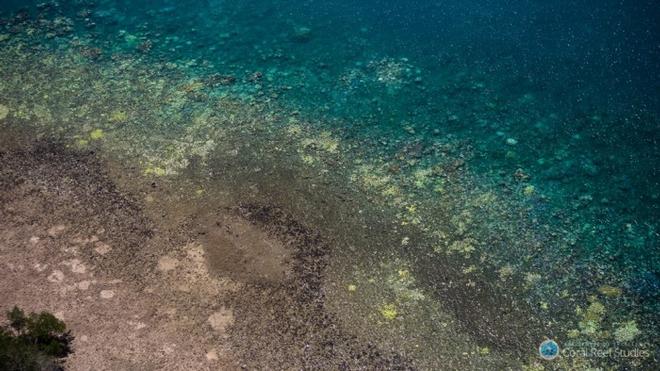Coral Bleaching Again - Call to Action
by Paul Aubin - Carefish on 22 Mar 2017

Extensive coral bleaching (white/yellow patches) documented on the Great Barrier Reef during aerial surveys in March 2016 ARC Centre of Excellence for Coral Reef Studies
It has become abundantly obvious to CAREFISH that climate change has eventuated and massive scale disruption and or destruction of our environment, particularly the Great Barrier Reef (GBR), is currently being experienced and is escalating. Whilst it is acknowledged that Governments are attending to some aspects and attempting to mitigate effects, it must be said that unless Australia leads an urgent change in world attitude towards climate repair, the immediate and long term future of the GBR, its fishery and dependant economies are in grave peril.
CAREFISH Position Statement
CAREFISH is alarmed and distressed at the inadequate Queensland, Australian, and global response to rectify climate change. Lack of action has resulted in the unprecedented destruction of over one quarter of the Great Barrier Reef in 2016 alone. This is escalating, affecting the fabric of Queensland communities, their economies and more importantly our ecosystems.
Even if the world adheres to the Paris Agreement on Climate Change, our Great Barrier Reef will likely still be lost! We call on all parties to redouble efforts to de-carbonise the atmosphere. Australia must walk away from fossil fuel production and rapidly move towards alternate, non polluting and or renewable energy sources, as well as embarking on aggressive reforestation/carbon capture projects.
It is imperative that ALL PARTIES urgently and co-operatively contribute and lead the country, and world, towards a net carbon zero future.
CAREFISH is a stakeholder group based in Cairns that takes interest in matters relating to recreational fishing and the marine environment. We actively participated in the extensive Great Barrier Reef Strategic Assessment process from draft through to completion which led to a position on the Reef 2050 Long Term Sustainability Plan, Reef Advisory Committee as Recreational Fishing representative.
We have studied potential and proven threats to the GBR, a World Heritage listed Area (WHA), and assisted various Government and non Government agencies and organisations to prioritise and plan efforts to reduce risk to the GBR and improve its condition.
Climate Change was listed as the number one threat to the GBR WHA by the managing agency GBRMPA in its 2014 Outlook Report. This is a signature once every five year study and report, based on best available science, made public to identify risks to the GBR and guide actions.
It is a well known and published fact that last year 67% of the remote northern one third of the entire Great Barrier Reef died from mass coral bleaching. That equates to around a quarter of the total GBR, scientists believe it was more, perhaps 28%. Let’s repeat that…
ONE QUARTER OF THE GREAT BARRIER REEF DIED LAST YEAR
At this moment another mass bleaching event is underway, mainly affecting the middle one third or so of the GBR, from Port Douglas to the Keppel’s, so far. We know from coral core sampling that there have been 3 major coral bleaching events in approximately the last eight hundred years, all of them were in the last twenty ie 1998, 2002 and 2016. 2016 was the most serious; we now have a fourth and the first back to back event recorded.
This is a compounding condition and is absolutely caused by consistent higher than average temperatures, something Cairns has undoubtedly and noticeably experienced in years of late. Currently, it is figured that average global temperature is one degree Celsius above pre industrial temperature and increasing. Science has warned us of this, over and over for decades and predicted likely outcomes, coral bleaching/destruction being one, mangrove die back/destruction being another (see links below showing adjacent 1000km mangrove die off).
Scientists report that corals experiencing extreme prolonged bleaching, such as the 2016 event, suffer complete mortality across the colony. They won’t recover, they have to be recolonised. For recolonisation to occur, other healthy corals within the pelagic reproductive region must do it. Obviously, if the other corals are either dead or repeatedly heat stressed, they won’t be up for the job, and clearly back to back mass bleaching does not offer much hope that adjacent corals will be in any helpful condition.
CAREFISH believes climate change has leapfrogged other threats in terms of urgency and potency. It is clear that the GBR is under extreme threat and in crises.
In light of this event, the question must be asked, “How can Queensland and Australia possibly continue to reconcile its enormous and expanding coal extraction programme and associated massive contribution to global greenhouse gases?” This can only be compared to the enormity of the consequences of a failed Great Barrier Reef.
Links
Additional material - James Cook University and also Sydney Morning Herald
Editor's Note - Paul Aubin is the Founder of CAREFISH - CAirns REcreational Fishing Industry StakeHolders, and is truly passionate about the area and this subject. He has states, 'There is a growing alarm over the emerging situation, clearly it is not going away. It is our goal to increase public awareness.' Additionally, he points out that apart from things like this occurring in FNQ, that he believes there is climate related mass kelp die off down the South end of Australia as well.
If you want to link to this article then please use this URL: www.sailworldcruising.com/152582